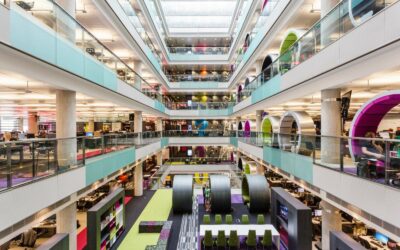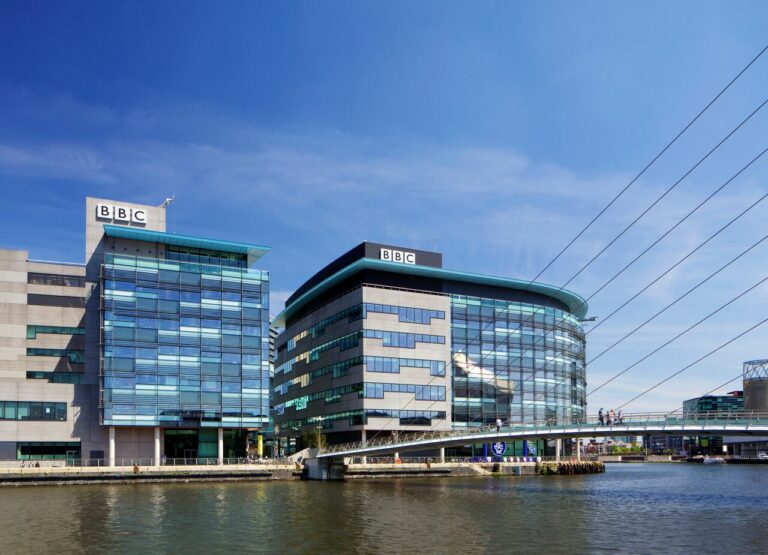Research published today by think-tank, Centre for Cities, claims that the BBC’s move to Salford has had a “minimal impact on employment across Greater Manchester.”
It said that the research should be a warning to cities bidding to be the home of Channel 4.
Centre for Cities showed that the move had led to 4600 new jobs between 2011 and 2016 at MediaCityUK (a 46% increase in employment), but many of these were as a result of the “displacement of businesses from other parts of Greater Manchester” rather than new firms setting up in the region.
It added that the BBC’s move brought around 4,420 jobs to the wider city region, or 0.3% of total Greater Manchester employment.
“The impact of the BBC’s relocation shows that the Government and city leaders should not overestimate the economic benefits of moving public sector jobs from London to other parts of the country. While the BBC’s move has been positive for Greater Manchester in other ways, it has done little to create new jobs across the city region, or to encourage new businesses to set up in the area,” explained Paul Swinney, principal economist of Centre for Cities.
“The lesson for cities bidding to be the new home of Channel 4 is that if they are successful, they should not expect to see a major boost to their economies beyond the jobs that the relocation would directly bring. More broadly, cities need to weigh up the costs of efforts to attract public bodies and jobs, as these resources might be better used to address skills-gaps or improve transport infrastructure instead.”
“If the Government is determined to relocate more public sector jobs across the country, it should move them to major cities which are already home to a large share of high-skilled workers and firms in related industries. For example, if the BBC had moved to a smaller city than Manchester with fewer high-skilled workers and a less diverse economy, it’s likely that the limited economic benefits it brought would have been less significant.”
“Ridiculous”
However, these numbers, which are based on analysis of Office for National Statistics’ Business Structure Database, are disputed by both politicians in Greater Manchester and the BBC.
Mike Blackburn, the chair of the Greater Manchester LEP commented: “quite frankly a report that says the BBC has not had a positive impact on Greater Manchester is ridiculous.
“The BBC move to Manchester has been extraordinary, transformational and was the catalyst for a media and creative boom, creating the second largest cluster of digital and creative business in Europe.
“The report is flawed, is far too narrow and fails to calculate the wider economic impact of jobs and the GVA of direct and non-direct BBC employees and their families and the benefit to the wider economy.”
Meanwhile the BBC pointed to a 2015 KPMG report that said that the BBC’s move to Salford was having a similar impact to financiers in the city of London; the scientific hubs in Cambridge; and F1 teams on the M4 corridor.
“We are surprised by this report as all other independent assessments of the BBC’s move to Salford have recognised the considerable benefit of the move, not just to the immediate MediaCityUK area, but to the wider economy of Greater Manchester and the North West,” said a BBC spokesperson.
“The BBC was crucial to the development of MediaCityUK, bringing thousands of jobs, millions of pounds of investment and supporting the wider creative industries. To suggest our investment only benefits Salford, and not the rest of the region, seems very strange given the scale and size of our operation today.
“As well as delivering economic benefits, the goal of our relocation was to better serve northern audiences, support the development of a world-class creative sector in the North, and bring financial benefits to the BBC. By all measures, including economic impact, we are succeeding.”
Sean Anstee, Greater Manchester Combined Authority’s lead for employment and skills, and leader of Trafford Council, said:
“We have seen phenomenal growth in our creative and digital sectors in Greater Manchester, making a compelling case for industrial clusters of excellence. The sector is worth £3.1bn to Greater Manchester’s economy – that’s double what it was in 2010. There are 55,000 thousand people employed in the sector. We are producing some of the most highly skilled graduates in the sector and are now in the top 20 European digital cities.
“This is a British success story, and the BBC’s move here has been a central part of that. It’s a cause for real celebration, and critical for the rebalancing of the nation’s economy to ensure that all of the nations and regions – and not just the capital – benefit from our amazing creative and digital talent.
“It is precisely because the BBC and ITV have a strong presence in our city region that we are such an attractive proposition for others, from Channel 4 to the 1,600 start-ups formed in Greater Manchester in the past year.”
While Salford City Mayor Paul Dennett added:
“The BBC’s move north has been a significant catalyst for the continued development and regeneration of Salford and Greater Manchester. With Greater Manchester boasting significant industrial strengths in creative industries and tech, increasingly characterising our skilled workforce it’s clear that global brands such as the BBC and ITV have been instrumental in Salford’s and Greater Manchester’s industrial renaissance.
“The BBC’s relocation to Salford has resulted in the clustering of 250 digital companies, providing 7,000 jobs at MediaCityUK, with the BBC’s spend in the north more than doubling between 2010/11 – 2015/16 to almost £420m and production spend tripling over the same period.
“Only in May this year, Salford was ranked as one of the top five hot-spots for start-ups, out-ranking London, with 1,393 new companies launching in the city between January and March.”











